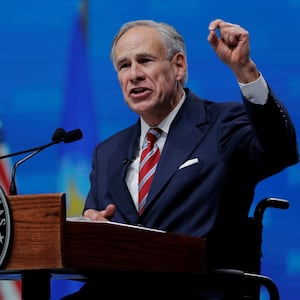The Supreme Court will allow border patrol agents to remove razor wire installed by Texas at the U.S.-Mexico border, part of a narrow ruling Monday that at least partially brings to a close the ongoing spat between state authorities and federal agencies over border policy.
The Court ruled 5-4 in favor of an emergency request by the Biden administration, with Chief Justice John Roberts and Justice Amy Coney Barrett joining the high court’s three liberals to grant the federal government’s request.
In a statement posted to X, Texas Attorney General Ken Paxton vowed that the “fight is not over.”
“The Supreme Court’s temporary order allows Biden to continue his illegal effort to aid the foreign invasion of America,” he fumed. “The destruction of Texas’s border barriers will not help enforce the law or keep American citizens safe.” Paxton added that he was looking forward “to defending our state’s sovereignty.”
Less than an hour later, Gov. Greg Abbott echoed his attorney general’s words, promising, “This is not over.”
“Texas’ razor wire is an effective deterrent to the illegal crossings Biden encourages,” he insisted in his own X statement. “I will continue to defend Texas’ constitutional authority to secure the border and prevent the Biden Admin from destroying our property.”
Abbott had ordered the razor wire placed at Eagle Pass, near the Rio Grande, as part of his aggressive Operation Lone Star plan to curb illegal crossings. The Biden administration claimed the wire prevented federal Border Patrol agents from doing their job of reaching migrants who had already crossed into the U.S.
Abbott has also overseen the installation of a floating barrier in the Rio Grande, the deployment of National Guard troops to the border, an aggressive campaign to bus migrants to cities with Democratic mayors across the country, and a bill passed by the state Legislature that put Texas officials in charge of immigration enforcement—an issue previously left to federal authorities.
Following these efforts, Operation Lone Star has been a frequent source of tension between Texas and the federal government in recent months. Several weeks ago, three migrants drowned in the Rio Grande, after which border patrol said that they had been “physically blocked” by Texas Military Department personnel from investigating.
TMD later said the drownings happened well before they were contacted by border agents—though in a subsequent news conference Abbott defended the standoff, taking place at a public park in Eagle Pass, as necessary to “maintain operational control.”






